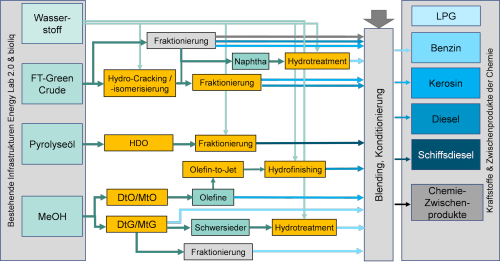Researchers of Karlsruhe Institute of Technology (KIT) and their partners have now launched the REF4FU (“Refineries for Future”) project to determine the refuel quantities needed and what future green refineries will have to look like to supply these quantities.
In spite of increasing electric mobility in the transport sector, we will continue to need liquid fuels for a long time. Only 60 percent of the fuel today is consumed by individual car traffic. When talking about phasing out of combustion engines, it is referred to car engines only.
—Professor Nicolaus Dahmen from KIT’s Institute of Catalysis Research and Technology (IKFT) and head of REF4FU
The REF4FU project is therefore aimed at developing, testing, and standardizing 100% renewable fuels for all transport sectors, including water and air traffic.

Scheme of the planned process network. From the starting materials shown on the left, fuel fractions are generated via the process stages shown in yellow, which are further processed to the various fuels.
REF4FU covers the use of sustainable hydrogen; pyrolysis oil based on biological residues, such as straw or waste wood; methanol from renewable feedstocks; and Fischer-Tropsch oil that corresponds to green crude oil.
Refuels are currently being produced on a pre-industrial scale. However, it is not yet clear how these fuels will be commercialized and transferred to the customers.
We already have processes and big, technically mature test facilities to produce tons of synthetic fuel. We cannot just sell them from barrels at the roadside.
—Professor Dahmen
To find out when and where which quantities of synthetic gasoline, diesel, or kerosene will be needed, researchers use scenarios that also take into account political goals regarding the electrification of road traffic or the expected developments in the different transport sectors. According to these scenarios, gasoline will disappear from the market first, Dahmen points out. This will affect future production capacities.
The REF4FU collaboration project coordinated by KIT is funded with around €7 million by the German Federal Ministry for Digital and Transport. Apart from the institutes of KIT (IKFT, IMVT, EBI-ceb, IFKM, IIP), the project partners are DLR – The German Aerospace Center, Deutsches Biomasseforschungszentrum (DBFZ), Technische Universität Bergakademie Freiberg, and Chemieanlagenbau Chemnitz, BASF, EDL Anlagenbau, and Ineratec. The MiRO refinery, Porsche, and ASG are associated project partners.